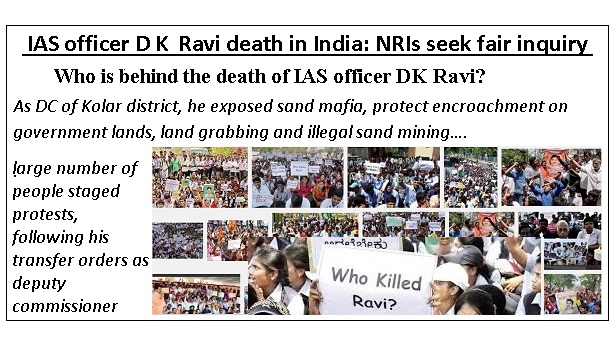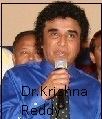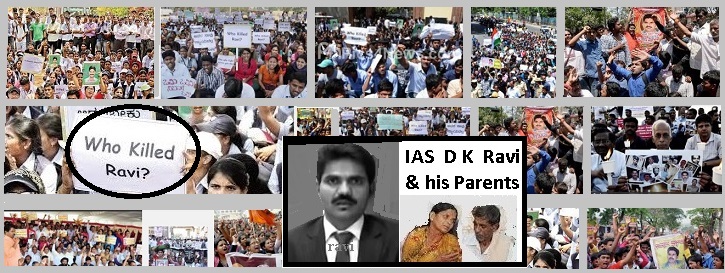| Connecting
over 25 millions NRIs worldwide |
|
|||||||||||||||||||||||
|
||
IAS officer D K Ravi death in India: NRIs seek fair inquiry
Los Angeles, March 30, 2015
The police version of the IAS officer committing suicide due to “personal reasons’’ has not been accepted by members of Ravi’s family, the opposition vast section of the public and IAS association. Due pressure from protests carried out by people across India, the state government agreed to hand over the case to the CBI on 23 March 2015. On 16 March 2015, Ravi was found hanging at his residence in Koramangala, Bangalore. He had gone to office from Nagarbhavi, Bangalore (the house of his in-laws), on Monday morning. He returned to his apartment at St John's Woods near Koramangala by 11.30 am. His family found him hanging by the ceiling fan in his bedroom of their apartment at 6:30 p.m.
The people took to the streets on March 17 across parts of Karnataka such as Kolar and Gulbarga, where he served as an Assistant Commissioner. Towns in Kolar district observed total bandh with shops, commercial establishments, schools and colleges staying closed during the day, with state-run and private buses, auto rickshaws and other vehicles not operating. The protest was joined by lawyers, students and workers of various political parties and organizations. D. K. Ravi (Doddakoppalu Kariyappa Ravi), 35, was an IAS (an Indian Administrative Service officer) of Karnataka cadre, from the 2009 batch. As deputy commissioner of the Kolar district, after launching an official crackdown against the encroachment of government lands and rampant illegal sand mining in the district. Doddakoppalu Kariyappa Ravi (10 June 1979 – 16 March 2015), commonly known as D. K. Ravi, was an Indian civil servant. He was an Indian Administrative Service officer of Karnataka cadre, from the 2009 batch.[1] Being an able and efficient administrator, he first came into limelight as a deputy commissioner of the Kolar district, after launching an official crackdown against the encroachment of government lands and rampant illegal sand mining in the district. He was transferred to Bangalore by the government of Karnataka as Additional Commissioner of Commercial Taxes (Enforcement) in October 2014. After his five months tenure as additional commissioner which involved tax raids on major tax evading Real estate firms - - - - - - - - - - - - - - - - - - - - - - - - - - - - - - - - - - - - - - - - - - - - (A eulogy followed by an Elegy)Malice spilled with Contumacy Bengaluru, March 27, 2015 Article by Senior Lawyers: C.B.Srinivasan, Shankarappa, Rameshchandra…….Senior Advocates The investigation into the death of the I.A.S. officer is now within the domain of the national premier investigation agency, the C.B.I. The enquiry is to pierce the web of suspicion surrounding the event: Was it Homicide? or Suicide? There was an initial, partial-farcical inquiry into it by a local police agency.It is highly inappropriate for the local agency to leak the material it has collected, all based on what it claimed to be the recorded statements of persons said to be connected with the incident. Those recorded statements, referable to Sections 161-162 of the Code of Criminal Procedure, are what is understood by even a novice in the legal profession, as totally inadmissible in evidence. They are not worth the paper on which they are written, or the cost of the ink with which they are reduced into writing; not even the time and credit that could be given to the carbon and ribbon employed in the computer printer, except their use during the trial of the case for the purpose of contradicting the evidence on oath of the witnesses before court. When they are, thus bereft of any legal value, it is highly malicious for the agency to bring it to the notice of the general public whether on its own or through the media. In the matter of investigation of a crime, it is basic that there ought to be no witch hunting. There ought to be also no attempt to malign the personal character of any one, be it the accused, the victim, the witness, or the investigating officials. Despite this cautious, conscientious warning against the likely damage to the concerned, the persistent effort made to release by instalments, news of the purported statements of witnesses concerning the personal life of the deceased is a deliberate malignant, calumnious propaganda against the dead man, at the instance of some interested persons who are hell bent to wreck the discovery of truth.Many a time, in the matter of appreciation of legal evidence, there is resort to a theory called ‘reductio ad absurdum’. For instance, when the question is one of matrimonial relationship of two individuals, a statement by the archak of a temple that the two were seen together in the temple , cannot lead to any evidence of their marriage, nor even to any suspicion of their extramarital relationship. In a trial held in this regard, if, in cross examination, the archak is asked whether he was sure of their relationship, be as a brother and sister, lovers or otherwise, he frankly feigns ignorance. The case for the prosecution flounders and falls. The accused are acquitted. Several such real life cases in court could be quoted.The statements in relation to the private life of the deceased, simply claimed to have been recorded by the police at their whims cannot aid any diversion of the real question in controversy. It points, without any doubt, to the invisible hands that are principal aids to the perpetrators of a crime. The accused though not yet ascertained, there does appear to be no stone unturned to shield them from being ensnared by the criminal investigators.The purported love declaration disclosed in the media as made by the deceased to his paramour, as hinted, is clearly not one made by Romeo or Juliet, but scripted by the poetic temperament of a wily Shakespeare! in the garb of a police officer!! Scoundrels are more proficient in the art of speech than the victims, and that is how the proverb is originated which proclaims that ‘devils quote scriptures’.The general public is aware of the natural, unsophisticated, heartfelt, generous, unalloyed, voluntary response it showed to the deceased without any hesitation. The school students-children, the medical and legal professionals, the media men, the residents of the town where he had worked, the matadhipathis, major political parties, the general public all and sundry participated in a demand for an impartial enquiry. They were not like the crowds normally hired by the political parties for their propaganda. The hearts of the common men bled to secure justice to the family of the victim. The scene was one that cannot be replicated even by a film producer.The monstrous irony visible to the eyes of a detached citizen is that on one side the Government provides a Police State Honour to the funeral of one of its servants in recognition of his honesty, uprightness, public spirit, selfless and devoted service. It was the rarest of rare events. The personality of the dead soul reached the acme of decorations the Government periodically announces to honour its citizens. But, even before a few days pass, the local police agency sets tone to a personal character assassination of the honoured one, as though his physical assassination was not enough! One is dazed by this duplicity of purpose of the instrumentality of the State reminding all that Brutus and Antony who sang different tunes about the end of Caesar take reincarnations again and again. Should not the soul of the dead be really, truly, honestly be allowed to rest in peace?The insinuations now set afloat through the media are designed to affect the judgement of the soft hearted, genuine, affectionate, innocent conglomeration of citizens who are scared of the alleged plotters of the event supported, as is said by sand mafia, the land mafia, tax-mafia and political marauders who are a scourge on society.The police cannot be attributed with any ignorance of the real situation of the merit of such oral statements when sought to be utilised before courts. The police, in most of the cases, record no statement of the persons as uttered, but as dictated their own fancy, honest or otherwise, of the case they are likely to take to court. That is how, lawyers make merry with a success when a troupe of witnesses in the witness stand feel it difficult to state on oath (‘I speak the truth, the whole truth and nothing but truth’) that the statements attributed to their mouths by the police are not in fact true. This is in law practice euphemistically called as ‘witnesses turning hostile.’ Majority of the cases in court fall flat and invite serious criticism by the courts about the shabby investigation only because of this time honoured mishmash of the police mindset. Divine be the day when police investigation is honest, legal, and acceptable by courts and result in the success of the prosecution.In the present case, the local investigation agency owes it to the public to follow conscientiously because the principal parties to the case are alleged to be the Police, Prosecutor, Politician and Perpetrator. All parties without any division sang praises of the ‘honest officer.’ Even the top political leaders of the governing party joined the chorus of laudation of the ‘Man of the Hour.’ The cause of reference by the Government to the C.B.I. was on this score. The Constitutional expectation of the declaration,’ We the People of India give to ourselves, JUSTICE, Social, Economical’ et all deserves to be obeyed in thought, word and deed. Let real Justice be secured.Luckily, every Indian has faith and hope that the flaming truth cannot be covered even by a golden lid of falsehood, calumny, criminal intent, or even subornation. In the land of Rama, unlike in the legend, there are Ravanas all around and they are sure to meet their destiny of self immolation.
Satyameva JayathePost Script: Eleven days have passed since the date of death of the hero of the times. Even as the emotional scenes of the tearful farewell by a multitude of the admirers, of the hero are fresh before one’s eyes, there has reappeared a scene of public participation by the general mass of pro-active persons in the death ceremonies of the officer. To say the least, the public adulation has voluntarily turned into adoration. His photos, the flowery decorations, the intimate processions have all marked an opinion that can be hard to erase from one’s memory. Apart from that, these natural outbursts of applause have surely punctured the guilty hearts of the dooms day they are likely to come to face in the immediate future.Hail ! D.K.Ravi.
|
||
| |
|
|


 After watching on TVs- the Protests continued in different parts of Karnataka and other parts of India, the response from NRIs (non-resident-Indians) across London- Toronto-New York to Los Angles demanded a fair enquiry into the causes leading into IAS D K Ravi death in Karnataka.
After watching on TVs- the Protests continued in different parts of Karnataka and other parts of India, the response from NRIs (non-resident-Indians) across London- Toronto-New York to Los Angles demanded a fair enquiry into the causes leading into IAS D K Ravi death in Karnataka.